Items filtered by date: October 2024
What Is Tarsal Tunnel Syndrome?
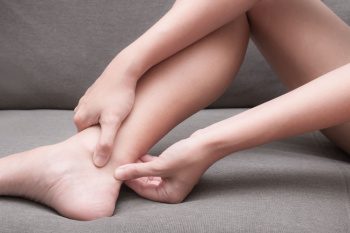
Tarsal tunnel syndrome is a condition that occurs when the tibial nerve is compressed as it passes through a narrow space in the ankle. Symptoms often include numbness, tingling, and burning sensations in the foot and toes. Individuals may also experience sharp or shooting pain that radiates from the ankle to the toes, particularly during activities that involve prolonged standing or walking.The causes of tarsal tunnel syndrome can vary widely. Common factors include flat feet, which can increase pressure on the nerve, as well as injuries or trauma to the ankle that result in swelling. Conditions such as diabetes, arthritis, or cysts may also contribute to nerve compression. If you have pain on the inside of the ankle, it is suggested that you consult a podiatrist who can provide an accurate diagnosis and treatment.
Tarsal tunnel syndrome can be very uncomfortable to live with. If you are experiencing tarsal tunnel syndrome, contact Dr. Scott Peters of Ankle & Foot Walk-In Clinic. Our doctor can provide the care you need to keep you pain-free and on your feet.
Tarsal Tunnel Syndrome
Tarsal tunnel syndrome, which can also be called tibial nerve dysfunction, is an uncommon condition of misfiring peripheral nerves in the foot. The tibial nerve is the peripheral nerve in the leg responsible for sensation and movement of the foot and calf muscles. In tarsal tunnel syndrome, the tibial nerve is damaged, causing problems with movement and feeling in the foot of the affected leg.
Common Cause of Tarsal Tunnel Syndrome
- Involves pressure or an injury, direct pressure on the tibial nerve for an extended period of time, sometimes caused by other body structures close by or near the knee.
- Diseases that damage nerves, including diabetes, may cause tarsal tunnel syndrome.
- At times, tarsal tunnel syndrome can appear without an obvious cause in some cases.
The Effects of Tarsal Tunnel Syndrome
- Different sensations, an afflicted person may experience pain, tingling, burning or other unusual sensations in the foot of the affected leg.
- The foot muscles, toes and ankle become weaker, and curling your toes or flexing your foot can become difficult.
- If condition worsens, infections and ulcers may develop on the foot that is experiencing the syndrome.
A physical exam of the leg can help identify the presence of tarsal tunnel syndrome. Medical tests, such as a nerve biopsy, are also used to diagnose the condition. Patients may receive physical therapy and prescriptive medication. In extreme cases, some may require surgery.
If you have any questions please feel free to contact our office located in Mayfield Village, OH . We offer the newest diagnostic and treatment technologies for all your foot and ankle needs.
Facts About Heel Stress Fractures
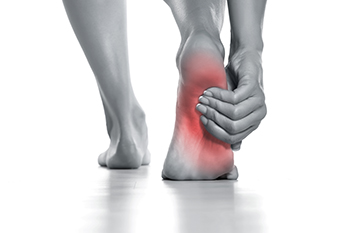
A calcaneal stress fracture is a less common but painful source of heel pain. It often affects people who have recently increased their physical activity, such as starting a new exercise routine or hiking long distances. This type of stress fracture involves microscopic cracks in the heel bone that develop due to repetitive pounding. The pain usually appears gradually, creating a deep, aching sensation, rather than the sharp pain associated with conditions like plantar fasciitis. The pain may worsen with activity, making it difficult to walk without limping. Diagnosing calcaneal stress fractures can be challenging as initial X-rays may not detect the tiny cracks. Advanced imaging, such as MRI scans may be needed. Treatment involves immobilization and restricted weight-bearing for six to eight weeks, often requiring a special boot. If you have heel pain that may have resulted from a stress fracture, it is suggested that you schedule an appointment with a podiatrist.
Activities where too much pressure is put on the feet can cause stress fractures. To learn more, contact Dr. Scott Peters from Ankle & Foot Walk-In Clinic. Our doctor can provide the care you need to keep your pain free and on your feet.
Dealing with Stress Fractures of the Foot and Ankle
Stress fractures occur in the foot and ankle when muscles in these areas weaken from too much or too little use. The feet and ankles then lose support when walking or running from the impact of the ground. Since there is no protection, the bones receive the full impact of each step. Stress on the feet can cause cracks to form in the bones, thus creating stress fractures.
What Are Stress Fractures?
Stress fractures occur frequently in individuals whose daily activities cause great impact on the feet and ankles. Stress factors are most common among:
- Runners
- People affected with Osteoporosis
- Tennis or basketball players
- Gymnasts
- High impact workouts
Symptoms
Pain from the fractures occur in the area of the fractures and can be constant or intermittent. It will often cause sharp or dull pain with swelling and tenderness. Engaging in any kind of activity which involves high impact will aggravate pain.
If you have any questions please feel free to contact our office located in Mayfield Village, OH . We offer the newest diagnostic and treatment technologies for all your foot and ankle needs.
Gout Pain Can Be Managed
Achilles Tendonitis Recovery Solutions
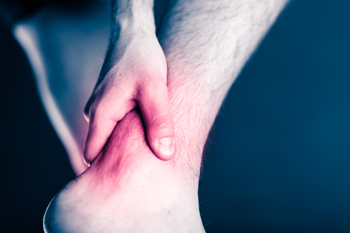
Recovering from Achilles tendonitis can be a gradual process that requires patience and attention to your body’s signals. Returning to physical activities like running too early can lead to re-injury. For that reason, it is essential to wait until pain and stiffness are completely gone before resuming your normal routines. Once you are pain-free, start back by reducing both the mileage and frequency of your runs. Incorporate cross-training exercises, such as cycling or swimming, to help maintain fitness without putting stress on the Achilles tendon. Gradually build up your activity level to avoid overloading the tendon. A podiatrist can offer guidance on safe recovery exercises and assess whether custom orthotics or specific footwear might prevent future Achilles tendonitis problems. Regular check-ins are advised, as this foot doctor can identify any lingering issues and provide strategies to support long-term recovery. If you have sustained an Achilles tendon injury, it is suggested that you promptly schedule an appointment with a podiatrist.
Achilles tendon injuries need immediate attention to avoid future complications. If you have any concerns, contact Dr. Scott Peters of Ankle & Foot Walk-In Clinic. Our doctor can provide the care you need to keep you pain-free and on your feet.
What Is the Achilles Tendon?
The Achilles tendon is a tendon that connects the lower leg muscles and calf to the heel of the foot. It is the strongest tendon in the human body and is essential for making movement possible. Because this tendon is such an integral part of the body, any injuries to it can create immense difficulties and should immediately be presented to a doctor.
What Are the Symptoms of an Achilles Tendon Injury?
There are various types of injuries that can affect the Achilles tendon. The two most common injuries are Achilles tendinitis and ruptures of the tendon.
Achilles Tendinitis Symptoms
- Inflammation
- Dull to severe pain
- Increased blood flow to the tendon
- Thickening of the tendon
Rupture Symptoms
- Extreme pain and swelling in the foot
- Total immobility
Treatment and Prevention
Achilles tendon injuries are diagnosed by a thorough physical evaluation, which can include an MRI. Treatment involves rest, physical therapy, and in some cases, surgery. However, various preventative measures can be taken to avoid these injuries, such as:
- Thorough stretching of the tendon before and after exercise
- Strengthening exercises like calf raises, squats, leg curls, leg extensions, leg raises, lunges, and leg presses
If you have any questions please feel free to contact our office located in Mayfield Village, OH . We offer the newest diagnostic tools and technology to treat your foot and ankle needs.
How Diabetic Neuropathy Affects the Feet
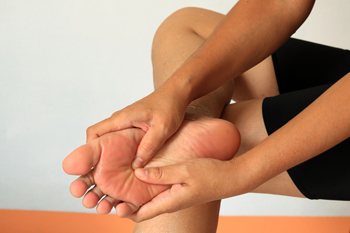
Diabetic neuropathy is a common complication of diabetes that primarily affects the feet. It often starts with feelings of tingling, burning, or numbness. Over time, the damage to nerves can lead to decreased sensitivity. This makes it harder to notice cuts, blisters, or sores, which can later become infected if untreated. The lack of sensation from diabetic neuropathy can also alter how you walk, increases the risk of injuries, or may result in formation of foot ulcers. Untreated foot infections can worsen and may even lead to gangrene or limb loss. A podiatrist plays a key role in helping patients with diabetic neuropathy. This foot doctor can identify early symptoms, treat foot complications, and provide strategies to protect the feet from further damage. Regular checkups, foot exams, and proper foot care routines are essential for maintaining foot health and preventing serious issues. If you suffer from diabetic neuropathy, it is suggested that you schedule regular appointments with a podiatrist for exams and treatment.
Neuropathy
Neuropathy can be a potentially serious condition, especially if it is left undiagnosed. If you have any concerns that you may be experiencing nerve loss in your feet, consult with Dr. Scott Peters from Ankle & Foot Walk-In Clinic. Our doctor will assess your condition and provide you with quality foot and ankle treatment for neuropathy.
What Is Neuropathy?
Neuropathy is a condition that leads to damage to the nerves in the body. Peripheral neuropathy, or neuropathy that affects your peripheral nervous system, usually occurs in the feet. Neuropathy can be triggered by a number of different causes. Such causes include diabetes, infections, cancers, disorders, and toxic substances.
Symptoms of Neuropathy Include:
- Numbness
- Sensation loss
- Prickling and tingling sensations
- Throbbing, freezing, burning pains
- Muscle weakness
Those with diabetes are at serious risk due to being unable to feel an ulcer on their feet. Diabetics usually also suffer from poor blood circulation. This can lead to the wound not healing, infections occurring, and the limb may have to be amputated.
Treatment
To treat neuropathy in the foot, podiatrists will first diagnose the cause of the neuropathy. Figuring out the underlying cause of the neuropathy will allow the podiatrist to prescribe the best treatment, whether it be caused by diabetes, toxic substance exposure, infection, etc. If the nerve has not died, then it’s possible that sensation may be able to return to the foot.
Pain medication may be issued for pain. Electrical nerve stimulation can be used to stimulate nerves. If the neuropathy is caused from pressure on the nerves, then surgery may be necessary.
If you have any questions, please feel free to contact our office located in Mayfield Village, OH . We offer the newest diagnostic and treatment technologies for all your foot care needs.
Enhancing Healing for Diabetic Foot Ulcers
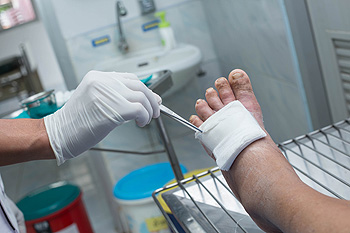
Diabetic foot ulcers require careful management to promote healing and prevent complications. Proper wound care involves keeping the ulcer clean and protected with appropriate dressings. Regular monitoring of blood glucose levels is vital, as stable glucose levels support the body's natural healing processes. Also, maintaining a healthy diet rich in vitamins and minerals can aid in wound repair. It is also important to relieve pressure on the affected foot by using specialized footwear or offloading devices. Daily foot inspections help catch any changes or infections early. A podiatrist can provide personalized treatment plans, including possible antibiotics or wound care therapies. If you have diabetes, it is suggested that you are under the care of a podiatrist who can help you to manage its effects on your feet.
Wound care is an important part in dealing with diabetes. If you have diabetes and a foot wound or would like more information about wound care for diabetics, consult with Dr. Scott Peters from Ankle & Foot Walk-In Clinic. Our doctor will assess your condition and provide you with quality foot and ankle treatment.
What Is Wound Care?
Wound care is the practice of taking proper care of a wound. This can range from the smallest to the largest of wounds. While everyone can benefit from proper wound care, it is much more important for diabetics. Diabetics often suffer from poor blood circulation which causes wounds to heal much slower than they would in a non-diabetic.
What Is the Importance of Wound Care?
While it may not seem apparent with small ulcers on the foot, for diabetics, any size ulcer can become infected. Diabetics often also suffer from neuropathy, or nerve loss. This means they might not even feel when they have an ulcer on their foot. If the wound becomes severely infected, amputation may be necessary. Therefore, it is of the upmost importance to properly care for any and all foot wounds.
How to Care for Wounds
The best way to care for foot wounds is to prevent them. For diabetics, this means daily inspections of the feet for any signs of abnormalities or ulcers. It is also recommended to see a podiatrist several times a year for a foot inspection. If you do have an ulcer, run the wound under water to clear dirt from the wound; then apply antibiotic ointment to the wound and cover with a bandage. Bandages should be changed daily and keeping pressure off the wound is smart. It is advised to see a podiatrist, who can keep an eye on it.
If you have any questions, please feel free to contact our office located in Mayfield Village, OH . We offer the newest diagnostic and treatment technologies for all your foot care needs.

